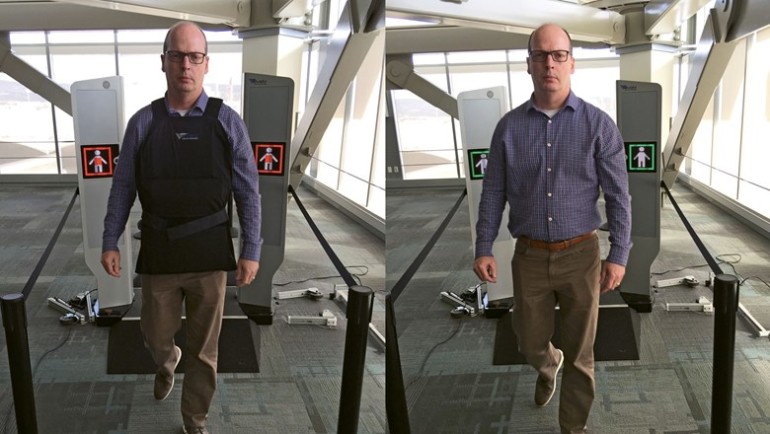Sponsored Listings:
OAKLAND, Calif. — A new-generation screening machine is aiding in Oakland Airport’s quest to fend off insider threats from employees and airline staff.
Waltham, Mass.-based Evolv Technology piloted its Edge screening system in late 2017 before introducing it here last May. Evolv account executive Bill McAteer said the system has since been deployed at Dallas/Fort Worth, San Juan, Seattle-Tacoma and London Heathrow airports.
Unlike the security screeners that flyers are accustomed to at TSA checkpoints, the Edge system is able to detect bomb materials in addition to metal objects.
Algorithm-powered artificial intelligence also enables the system to recognize ordinary objects that individuals would be expected to be carrying, such as cellphones, wallets and keys. Another plus is that subjects can be scanned as they are walking.
Subjects who set off an alert are quickly flagged red on digital graphic displays visible to security workers. The graphic also indicates the portion of the body where the suspicious item has been located. When a subject doesn’t set off an alert, the machine displays a green graphic.
“The Evolv machine has really transformed our employee screening,” said Doug Mansel, Oakland Airport’s head of security. The system, he said, has functionality to allow for employees to walk through with purses and bags, but Oakland chooses to inspect those anyway, primarily to avoid false alerts that would slow down the screening process. However, employees can walk through the system with their phones and wallets.
Mansel said the system is popular with employees because it removes the need for pat-downs.
“They’ve really helped us find this balance between security and throughput,” Mansel said of Evolv Technology.
Troubling breaches
For Oakland, the insider threat is more than merely theoretical. Ten people have been convicted so far in federal court in relation to a marijuana smuggling ring that airport employees, including Southwest baggage handlers, operated from 2012 to 2015. Entering an airport area in violation of security requirements was among the crimes eight of those individuals were convicted of committing.
Oakland, of course, isn’t the only airport that has fallen victim to unscrupulous workers. In this decade alone, Atlanta’s Hartsfield-Jackson Airport has been the stage of both a heroin-trafficking operation facilitated by TSA screeners and a gun-smuggling operation involving Delta employees.
Those incidents led Hartsfield-Jackson to open an employee-screening checkpoint in 2015.
More ominous still, in 2013 a Wichita (Kan.) Airport worker was arrested for allegedly arming a bomb and attempting to open a security access gate.
Like Atlanta and Oakland, many airports have begun screening workers, often working in conjunction with the TSA.
“I think most airports are doing at least random screening,” said Mansel, who said that is the approach Oakland is taking.
He added that screening is just one tool that Oakland and other airports use to thwart insider threats. Oakland has also begun looking at developing analytics technology that can spot unusual patterns in the usage of employee badges.
Christopher Bidwell, senior vice president of security for the trade group Airports Council International-North America, said that measures such as situational-awareness training, closed-circuit television systems and airport worker background checks are all either widely deployed or required under federal law.
Evolv CEO Mike Ellenbogen said that by speeding the employee-screening process, the Edge system benefits flyers in ways that go beyond their safety.
“The more efficient you can make that process, the more likely it is the planes will run on time,” Ellenbogen said.
Source: travelweekly.com










